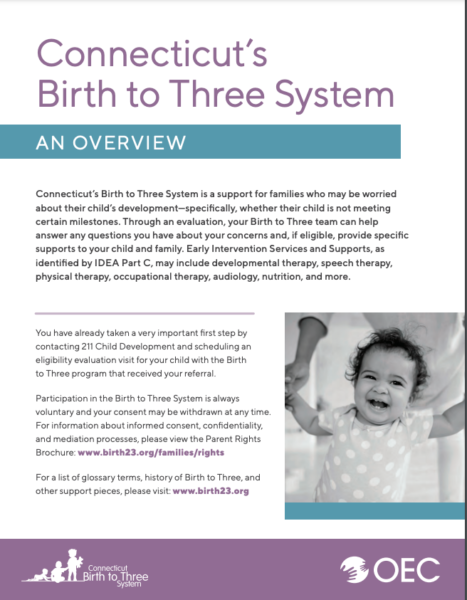Family Resources
On this page
Parent rights
Birth to Three handbooks
Child development
Support for children with disabilities and their families
Blind and visually impaired
Deaf and hard of hearing
Parent rights
As the parent or guardian of a child with special needs, you need to know your rights under federal law. Learn more from our brochure, which we’ve translated into many languages.
English
Spanish
Arabic
Bengali
Brazilian Portuguese
Haitian Creole
Hindi
Polish
Simplified Chinese
Telugu
Urdu

Birth to Three handbooks
- Connecticut’s Birth to Three System Overview (Family Handbook Guide 1). Learn about eligibility and what to expect during the evaluation. English ~ Spanish ~ Arabic ~ Bengali ~ Haitian Creole Hindi ~ Polish ~ Portuguese ~ Simplified Chinese ~ Telugu ~ Urdu
- Orientation to Supports for Families of Eligible Children (Family Handbook Guide 2). Learn what to expect when your child is getting supports from Birth to Three. English ~ Spanish ~ Arabic ~ Bengali ~ Haitian Creole ~ Hindi ~ Polish ~ Portuguese ~ Simplified Chinese ~ Telugu ~ Urdu
- Family Handbook Guide 3: Transition to Early Childhood Special Education Find out what to expect as your child leaves Birth to Three services. English ~ Spanish
Child development
The Ages and Stages Questionnaires (ASQ-3) provide a fun, interactive way to understand your child’s skills and notice changes over time. Visit 2-1-1 Child Development Ages and Stages webpage to learn more about how you can answer a few questions and begin to keep track of your child’s development from 2 months to 5 years of age.
Check out this Step by Step Guide for supporting your child’s development. (English) (Spanish)
CT Early Learning and Development Standards (CT ELDS) provide a common language about what children should know and be able to do from birth to age five. Check out the CT ELDS Strategies for Learning at Home.
Support for children with disabilities and their families
Connecticut Family Support Network (CTFSN) was created to help families raising children with disabilities and special healthcare needs throughout their lives. Check out CTFSN’s website.
Connecticut Parent Advocacy Center (CPAC) is dedicated to children with disabilities and chronic health problems. Experts at CPAC help parents advocate for their children, so their kids can learn to their full potential. CPAC also has information about the laws that protect children with disabilities, like IDEA (Individuals with Disabilities Education Act). Find out how CPAC can help your family.
CPAC also runs the Family Connections Program that can connect you with other families who are or have been in the Birth to Three system. Learn more about the Family Connections Program.
Moving out of Connecticut? Find Birth to Three contacts in other states.
PATH Parent to Parent can connect you with other families. Ask questions and post topics for discussion with other parents. Learn more on the PATH website.
Blind and visually impaired
The Bureau of Education and Services for the Blind (BESB) provides specialized services, training, and adaptive materials for children who are legally blind, visually impaired, or deafblind. Learn more (English) (Spanish)
Learn more on making a referral to BESB.
Deaf and hard of hearing
- Check out our “How’s my child doing?” handout (English) (Spanish)
- Learn about hearing specialty supports (Handouts being updated)
- Fill out our Family Plan of Care form
- Connect with Connecticut Hands & Voices, a non-profit organization dedicated to supporting families with children who are Deaf or Hard of Hearing
- Get more information about diagnosing hearing loss in infants from the CT Department of Health’s Early Hearing Detection and Intervention (EHDI) program.
Watch a video about our EIS programs that offer Deaf/Hard of Hearing (DHH) supports.